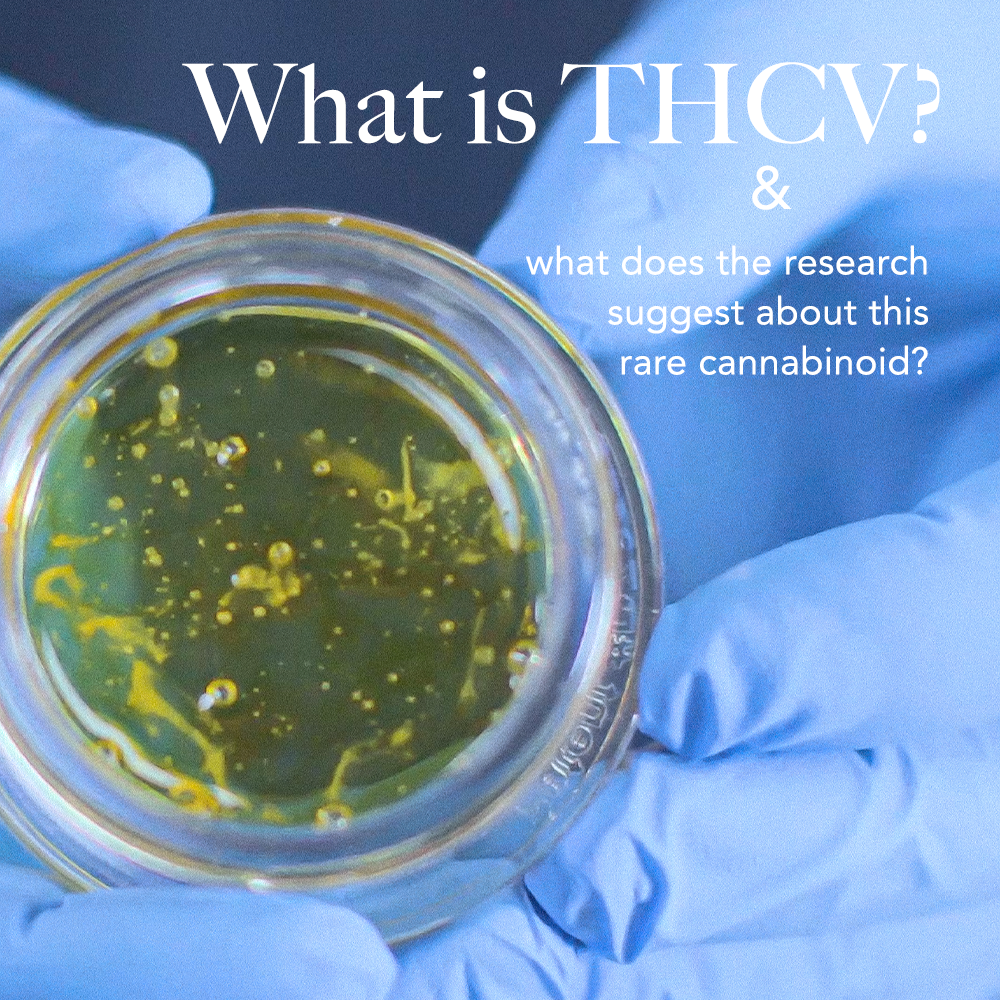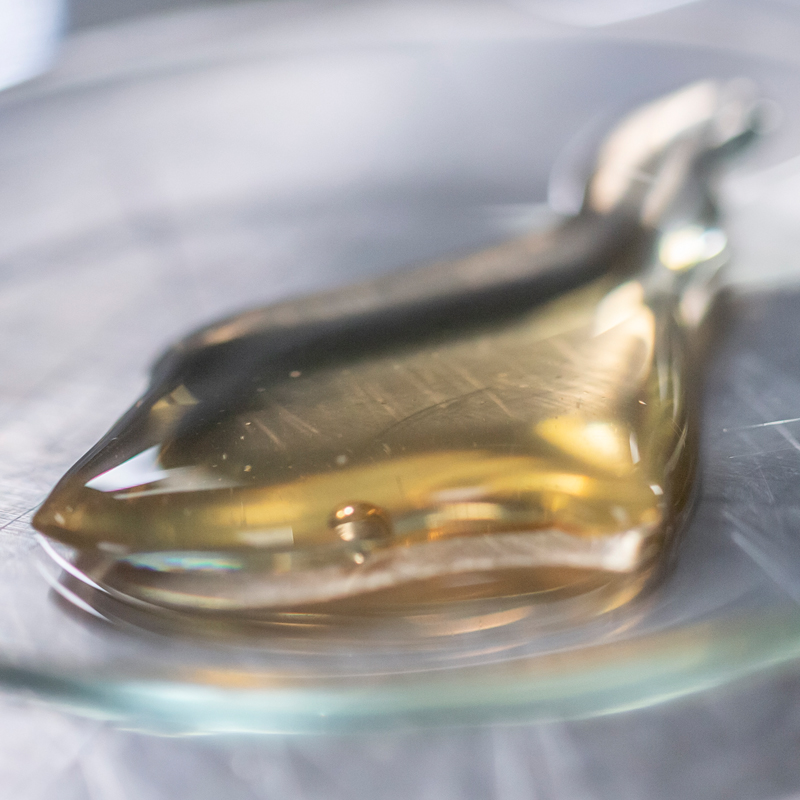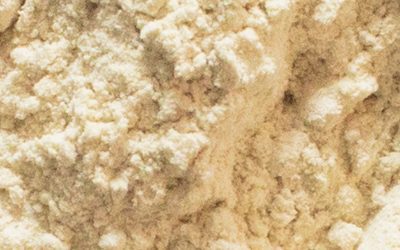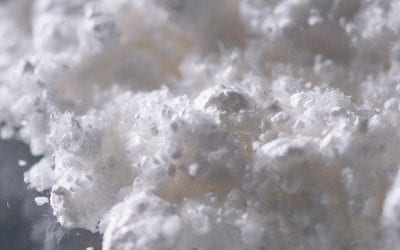
What is THCV?
Tetrahydrocannabivarin (THCV) is a minor cannabinoid that naturally occurs in hemp plants. Although THCV isolate is similar in name to THC (the compound that is responsible for marijuana’s mind-altering effects), the two compounds are actually quite different. THCV has a huge range of wellness benefits. This blog post will review scientific studies to explain what THCV is good for, if THCV is psychoactive, and what THCV products are best for formulating innovative wellness products.
What is THCV good for?
Like most cannabinoids, THCV did not become a research focus until very recently. As of today, research findings on THCV are relatively limited. Nonetheless, these few studies have produced extremely positive results and have helped fast-track THCV to phase 2 of FDA clinical trials.(1) Potential medical uses of THCV that are currently under investigation are listed below:
Obesity and diabetes:
THCV is extremely promising as a treatment for obesity and diabetes. In 2016, a double-blind, placebo-controlled studied on 62 adults found that THCV significantly reduced fasting plasma glucose, a key issue in Type II diabetes.(2) Animal studies had previously indicated that THCV may decrease blood sugar(3), but the results from this rigorous human study were particularly exciting.
In addition to reducing blood sugar, the aforementioned study also found that THCV improved pancreatic β-cell function, adiponectin, and apolipoprotein A (ApoA1). Pancreatic β-cell are responsible for producing insulin, adiponectin is involved in regulating blood sugar and breaking down fatty acids, and ApoA1 is a key component in HDL, or “good cholesterol” as it is more commonly known.(4) The fact that THCV was found to be safe, well-tolerated, and so beneficial for this range of conditions is truly remarkable.
Another double-blind, placebo-controlled study from 2014 found that THCV may regulate neural responses to food to fight obesity. Volunteers in this study did not perceive their subjective experiences of food to be different, but brain imaging clearly showed that THCV changed the way they reacted to foods like chocolate. Researchers concluded, “This effect profile suggests therapeutic activity in obesity, perhaps with a lowered risk of depressive side effects.”(5)
If THCV truly can lower blood sugar and fight obesity by curbing appetites, it has the potential to improve hundreds of millions of lives.
Pain and inflammation:
The human studies on THCV’s potential to treat obesity and diabetes are hard to beat. However, animal studies also suggest that THCV should be investigated as a treatment for a much larger range of ailments.
In one animal study, THCV was found to decrease signs of both pain and inflammation in animals.(6) This was doubly exciting, as it suggested that THCV could block out the pain that is caused by inflammation and reduce the inflammation that causes pain. While human studies will be needed to confirm these results, the early indicators are looking good.
Liver disease:
THCV and CBD have also been investigated as therapeutic agents for fatty liver disease. In a 2015 study, the two cannabinoids reduced fat accumulation in fatty liver models, as well as improve fat metabolism. Similar to the authors of the diabetes and obesity studies above, the researchers behind this study concluded, “Our results suggest that THCV and CBD might be used as new therapeutic agents for the pharmacological treatment of obesity- and metabolic syndrome-related [fatty liver disease].”(7)
Nicotine dependence:
Finally, a study published less than a year ago suggested that THCV may be a key factor in treating nicotine addiction. In this study, THCV supplementation significantly decreased self-administered nicotine intake and withdrawal symptoms in mice. The authors suggest that further research will reveal whether THCV might help people stop smoking or perhaps even quit a broader range of drugs.(8)
Does THCV Get You High?
While THCV is occasionally reported to be psychoactive, the scientific evidence tells a different story. The study detailing THCV’s positive effects on liver function specifically describes THCV as a “non-psychoactive cannabinoid.” Plus, other studies suggest that THCV may actually improve cognitive function.
In a 2015 study, scientists observed that THCV actually produced antipsychotic effects in animals. Researchers concluded that “THCV has therapeutic potential for ameliorating some of the negative, cognitive and positive symptoms of schizophrenia.”(9)
More recently, a rigorous human study has supported THCV’s benefits. In a 2016 study, cannabis users supplemented with THCV or a placebo for several days. THCV was found to be “indistinguishable” from the placebo. After 5 days, the THCV group and the placebo group were both given small doses of THC. Interestingly, the THCV group exhibited superior verbal recall and lower heart rates as compared to the placebo group, suggesting that THCV actually had a protective effect against THC’s intoxicating effects.(10)
It’s worth re-emphasizing how exciting these human studies are. Research on animals can reveal the promise of cannabinoids, but it is clearly no substitute for human trials. The fact that THCV has been well-tolerated and efficacious in human studies is extremely significant.
THCV Strains
Unfortunately, it is not always easy to find quality THCV products. Different hemp strains contain different levels of THCV, but the vast majority of hemp plants contain less than 1% THCV.(11) This means that full-spectrum hemp distillates will contain far more CBD than THCV. If you want a quality THCV supplement, you’ll have to turn elsewhere.
THCV Oil
Thanks to scientific breakthroughs in processing techniques, a few processors have learned how to isolate THCV with almost no product impurities. By using THCV Isolate as an ingredient, you can standardize your formulating methods to get precise amounts of THCV into your finished cannabinoid products.
Our THCV isolate or THCV oil is consistently greater than 98% pure. This high purity allows for adequate doses and easy product formulation. With THCV finally becoming commercially available, we expect to see more THCV supplementation and further research.
References
1) GW Research Ltd. WMD1092 – GWP42003 : GWP42004 Together Plus Alone in Type II Diabetes. U.S. National Library of Medicine. 2014.
2) Jadoon KA, Ratcliffe SH, Barrett DA, et al. Efficacy and Safety of Cannabidiol and Tetrahydrocannabivarin on Glycemic and Lipid Parameters in Patients With Type 2 Diabetes: A Randomized, Double-Blind, Placebo-Controlled, Parallel Group Pilot Study. Diabetes Care. 2016;39(10):1777-1786.
3) Abioye, A., Ayodele, O., Marinkovic, A. et al. Δ9-Tetrahydrocannabivarin (THCV): a commentary on potential therapeutic benefit for the management of obesity and diabetes. J Cannabis Res 2, 6 (2020). https://doi.org/10.1186/s42238-020-0016-7
4) Ibid (2),
5) Tudge L, Williams C, Cowen PJ, McCabe C. Neural effects of cannabinoid CB1 neutral antagonist tetrahydrocannabivarin on food reward and aversion in healthy volunteers. Int J Neuropsychopharmacol. 2014;18(6):pyu094. Published 2014 Dec 25.
6) Bolognini D, Costa B, Maione S, et al. The plant cannabinoid Delta9-tetrahydrocannabivarin can decrease signs of inflammation and inflammatory pain in mice. Br J Pharmacol. 2010;160(3):677-687.
7) Silvestri C, Paris D, Martella A, et al. Two non-psychoactive cannabinoids reduce intracellular lipid levels and inhibit hepatosteatosis. J Hepatol. 2015;62(6):1382-1390.
8) Xi ZX, Muldoon P, Wang XF, et al. Δ8 -Tetrahydrocannabivarin has potent anti-nicotine effects in several rodent models of nicotine dependence. Br J Pharmacol. 2019;176(24):4773-4784.
9) Cascio MG, Zamberletti E, Marini P, Parolaro D, Pertwee RG. The phytocannabinoid, Δ⁹-tetrahydrocannabivarin, can act through 5-HT₁A receptors to produce antipsychotic effects. Br J Pharmacol. 2015;172(5):1305-1318.
10) Englund A, Atakan Z, Kralj A, Tunstall N, Murray R, Morrison P. The effect of five day dosing with THCV on THC-induced cognitive, psychological and physiological effects in healthy male human volunteers: A placebo-controlled, double-blind, crossover pilot trial. J Psychopharmacol. 2016;30(2):140-151.
11) Coogan, T.A. Analysis of the cannabinoid content of strains available in the New Jersey Medicinal Marijuana Program. J Cannabis Res 1, 11 (2019).

What is THCV?
Tetrahydrocannabivarin (THCV) is a minor cannabinoid that naturally occurs in hemp plants. Although THCV is similar in name to THC (the compound that is responsible for marijuana’s mind-altering effects), the two compounds are actually quite different. THCV has a huge range of wellness benefits. This blog post will review scientific studies to explain what THCV is good for, if THCV is psychoactive, and what THCV products are best for formulating innovative wellness products.
What is THCV good for?
Like most cannabinoids, THCV did not become a research focus until very recently. As of today, research findings on THCV are relatively limited. Nonetheless, these few studies have produced extremely positive results and have helped fast-track THCV to phase 2 of FDA clinical trials.(1) Potential medical uses of THCV that are currently under investigation are listed below:
Obesity and diabetes:
THCV is extremely promising as a treatment for obesity and diabetes. In 2016, a double-blind, placebo-controlled studied on 62 adults found that THCV significantly reduced fasting plasma glucose, a key issue in Type II diabetes.(2) Animal studies had previously indicated that THCV may decrease blood sugar(3), but the results from this rigorous human study were particularly exciting.
In addition to reducing blood sugar, the aforementioned study also found that THCV improved pancreatic β-cell function, adiponectin, and apolipoprotein A (ApoA1). Pancreatic β-cell are responsible for producing insulin, adiponectin is involved in regulating blood sugar and breaking down fatty acids, and ApoA1 is a key component in HDL, or “good cholesterol” as it is more commonly known.(4) The fact that THCV was found to be safe, well-tolerated, and so beneficial for this range of conditions is truly remarkable.
Another double-blind, placebo-controlled study from 2014 found that THCV may regulate neural responses to food to fight obesity. Volunteers in this study did not perceive their subjective experiences of food to be different, but brain imaging clearly showed that THCV changed the way they reacted to foods like chocolate. Researchers concluded, “This effect profile suggests therapeutic activity in obesity, perhaps with a lowered risk of depressive side effects.”(5)
If THCV truly can lower blood sugar and fight obesity by curbing appetites, it has the potential to improve hundreds of millions of lives.
Pain and inflammation:
The human studies on THCV’s potential to treat obesity and diabetes are hard to beat. However, animal studies also suggest that THCV should be investigated as a treatment for a much larger range of ailments.
In one animal study, THCV was found to decrease signs of both pain and inflammation in animals.(6) This was doubly exciting, as it suggested that THCV could block out the pain that is caused by inflammation and reduce the inflammation that causes pain. While human studies will be needed to confirm these results, the early indicators are looking good.
Liver disease:
THCV and CBD have also been investigated as therapeutic agents for fatty liver disease. In a 2015 study, the two cannabinoids reduced fat accumulation in fatty liver models, as well as improve fat metabolism. Similar to the authors of the diabetes and obesity studies above, the researchers behind this study concluded, “Our results suggest that THCV and CBD might be used as new therapeutic agents for the pharmacological treatment of obesity- and metabolic syndrome-related [fatty liver disease].”(7)
Nicotine dependence:
Finally, a study published less than a year ago suggested that THCV may be a key factor in treating nicotine addiction. In this study, THCV supplementation significantly decreased self-administered nicotine intake and withdrawal symptoms in mice. The authors suggest that further research will reveal whether THCV might help people stop smoking or perhaps even quit a broader range of drugs.(8)
Does THCV Get You High?
While THCV is occasionally reported to be psychoactive, the scientific evidence tells a different story. The study detailing THCV’s positive effects on liver function specifically describes THCV as a “non-psychoactive cannabinoid.” Plus, other studies suggest that THCV may actually improve cognitive function.
In a 2015 study, scientists observed that THCV actually produced antipsychotic effects in animals. Researchers concluded that “THCV has therapeutic potential for ameliorating some of the negative, cognitive and positive symptoms of schizophrenia.”(9)
More recently, a rigorous human study has supported THCV’s benefits. In a 2016 study, cannabis users supplemented with THCV or a placebo for several days. THCV was found to be “indistinguishable” from the placebo. After 5 days, the THCV group and the placebo group were both given small doses of THC. Interestingly, the THCV group exhibited superior verbal recall and lower heart rates as compared to the placebo group, suggesting that THCV actually had a protective effect against THC’s intoxicating effects.(10)
It’s worth re-emphasizing how exciting these human studies are. Research on animals can reveal the promise of cannabinoids, but it is clearly no substitute for human trials. The fact that THCV has been well-tolerated and efficacious in human studies is extremely significant.
THCV Strains
Unfortunately, it is not always easy to find quality THCV products. Different hemp strains contain different levels of THCV, but the vast majority of hemp plants contain less than 1% THCV.(11) This means that full-spectrum hemp distillates will contain far more CBD than THCV. If you want a quality THCV supplement, you’ll have to turn elsewhere.
THCV Oil
Thanks to scientific breakthroughs in processing techniques, a few processors have learned how to isolate THCV with almost no product impurities. Our THCV isolate or THCV oil is consistently greater than 98% pure. This high purity allows for adequate doses and easy product formulation. With THCV finally becoming commercially available, we expect to see more THCV supplementation and further research.
References
1) GW Research Ltd. WMD1092 – GWP42003 : GWP42004 Together Plus Alone in Type II Diabetes. U.S. National Library of Medicine. 2014.
2) Jadoon KA, Ratcliffe SH, Barrett DA, et al. Efficacy and Safety of Cannabidiol and Tetrahydrocannabivarin on Glycemic and Lipid Parameters in Patients With Type 2 Diabetes: A Randomized, Double-Blind, Placebo-Controlled, Parallel Group Pilot Study. Diabetes Care. 2016;39(10):1777-1786.
3) Abioye, A., Ayodele, O., Marinkovic, A. et al. Δ9-Tetrahydrocannabivarin (THCV): a commentary on potential therapeutic benefit for the management of obesity and diabetes. J Cannabis Res 2, 6 (2020). https://doi.org/10.1186/s42238-020-0016-7
4) Ibid (2),
5) Tudge L, Williams C, Cowen PJ, McCabe C. Neural effects of cannabinoid CB1 neutral antagonist tetrahydrocannabivarin on food reward and aversion in healthy volunteers. Int J Neuropsychopharmacol. 2014;18(6):pyu094. Published 2014 Dec 25.
6) Bolognini D, Costa B, Maione S, et al. The plant cannabinoid Delta9-tetrahydrocannabivarin can decrease signs of inflammation and inflammatory pain in mice. Br J Pharmacol. 2010;160(3):677-687.
7) Silvestri C, Paris D, Martella A, et al. Two non-psychoactive cannabinoids reduce intracellular lipid levels and inhibit hepatosteatosis. J Hepatol. 2015;62(6):1382-1390.
8) Xi ZX, Muldoon P, Wang XF, et al. Δ8 -Tetrahydrocannabivarin has potent anti-nicotine effects in several rodent models of nicotine dependence. Br J Pharmacol. 2019;176(24):4773-4784.
9) Cascio MG, Zamberletti E, Marini P, Parolaro D, Pertwee RG. The phytocannabinoid, Δ⁹-tetrahydrocannabivarin, can act through 5-HT₁A receptors to produce antipsychotic effects. Br J Pharmacol. 2015;172(5):1305-1318.
10) Englund A, Atakan Z, Kralj A, Tunstall N, Murray R, Morrison P. The effect of five day dosing with THCV on THC-induced cognitive, psychological and physiological effects in healthy male human volunteers: A placebo-controlled, double-blind, crossover pilot trial. J Psychopharmacol. 2016;30(2):140-151.
11) Coogan, T.A. Analysis of the cannabinoid content of strains available in the New Jersey Medicinal Marijuana Program. J Cannabis Res 1, 11 (2019).




